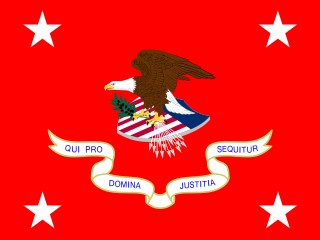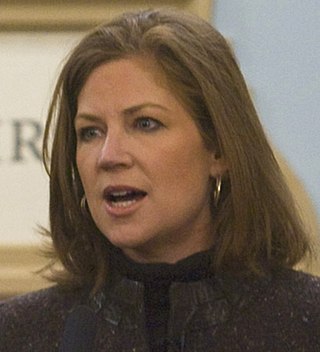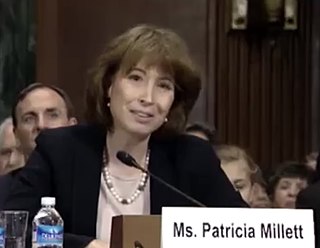
The Solicitor General of the United States, the fourth-highest-ranking official within the United States Department of Justice, represents the federal government in cases before the U.S. Supreme Court. Elizabeth Prelogar has served in the role since October 28, 2021.

The Volokh Conspiracy is a legal blog co-founded in 2002 by law professor Eugene Volokh, covering legal and political issues from an ideological orientation it describes as "generally libertarian, conservative, centrist, or some mixture of these." It is one of the most widely read and cited legal blogs in the United States. The blog is written by legal scholars and provides discussion on complex court decisions.

Elena Kagan is an American lawyer who serves as an associate justice of the Supreme Court of the United States. She was appointed in 2010 by President Barack Obama and is the fourth woman to serve on the Court.

Thomas Che Goldstein is an American lawyer. He is known for his advocacy before and blog about the Supreme Court of the United States. He was a founding partner of Goldstein and Howe, a Washington, D.C., firm specializing in Supreme Court litigation, and was, until the end of 2010, a partner at Akin Gump, where he was co-head of the litigation and Supreme Court practices. He retired from Goldstein & Russell in March 2023.

Fred Patterson Graham was an American legal affairs journalist, television news anchor, and attorney. He was the chief anchor and managing editor of the former Court TV. He also won a Peabody award for his work as a CBS law correspondent.

Jan Crawford Greenburg is an American television journalist, author, and attorney. She serves as a political correspondent and chief legal correspondent for CBS News and previously for ABC News. She appears regularly on the CBS Evening News, Face the Nation, CBS This Morning, and CBS News Sunday Morning. She led CBS News's coverage of the 2012 Presidential Elections. She is a New York Times bestselling author of Supreme Conflict: The Inside Story of the Struggle for Control of the United States Supreme Court and also a member of the New York State Bar Association.

Patricia Ann Millett is an American lawyer and jurist serving since 2013 as a U.S. circuit judge of the U.S. Court of Appeals for the District of Columbia Circuit. She formerly headed the Supreme Court practice at the law firm Akin Gump Strauss Hauer & Feld. Millett also was a longtime former assistant to the United States Solicitor General and served as an occasional blogger for SCOTUSblog. At the time of her confirmation to the D.C. Circuit, she had argued 32 cases before the United States Supreme Court. In February 2016 The New York Times identified her as a potential nominee to replace Justice Antonin Scalia.

Ketanji Onyika Brown Jackson is an American lawyer and jurist who is an associate justice of the Supreme Court of the United States. Jackson was nominated to the Supreme Court by President Joe Biden on February 25, 2022, and confirmed by the U.S. Senate and sworn into office that same year. She is the first black woman and the first former federal public defender to serve on the Supreme Court. From 2021 to 2022, Jackson was a United States circuit judge of the United States Court of Appeals for the District of Columbia Circuit.

Lyle Denniston is an American journalist, professor, and author who has reported on the Supreme Court of the United States since 1958. He wrote for SCOTUSblog, an online blog featuring news and analysis of the Supreme Court, until June 2016, after previously having written for multiple national newspapers and legal periodicals. His commentary is also featured on the National Public Radio show Here and Now. In addition, he has contributed to numerous books and journals, and is the author of "The Reporter and the Law: Techniques for Covering the Courts." Denniston has taught classes on law, journalism, and American constitutional history at American University, Georgetown University, Penn State University, and Johns Hopkins University.
Chamber of Commerce v. Whiting, 563 U.S. 582 (2011), is a decision by the Supreme Court of the United States that upheld an Arizona state law suspending or revoking business licenses of businesses that hire illegal aliens.
Fisher v. University of Texas, 570 U.S. 297 (2013), also known as Fisher I, is a United States Supreme Court case concerning the affirmative action admissions policy of the University of Texas at Austin. The Supreme Court voided the lower appellate court's ruling in favor of the university and remanded the case, holding that the lower court had not applied the standard of strict scrutiny, articulated in Grutter v. Bollinger (2003) and Regents of the University of California v. Bakke (1978), to its admissions program. The Court's ruling in Fisher took Grutter and Bakke as given and did not directly revisit the constitutionality of using race as a factor in college admissions.
Arkansas Game and Fish Commission v. United States, 568 U.S. 23 (2012), is a decision by the Supreme Court of the United States holding that it was possible for government-induced, temporary flooding to constitute a "taking" of property under the Fifth Amendment to the U.S. Constitution, such that compensation could be owed to the owner of the flooded property.
Tanco v. Haslam was the lead case in the dispute of same-sex marriage in Tennessee. A U.S. District Court granted a preliminary injunction requiring the state to recognize the marriages of the plaintiffs, three same-sex couples. The court found the equal protection analysis used in Bourke v. Beshear, a case dealing with a comparable Kentucky statute "especially persuasive." On April 25, 2014, that injunction was stayed by the Sixth Circuit Court of Appeals. Tanco was appealed to the Sixth Circuit, which reversed the district court and upheld Tennessee's refusal to recognize same-sex marriages from other jurisdictions on November 6.
Burwell v. Hobby Lobby Stores, Inc., 573 U.S. 682 (2014), is a landmark decision in United States corporate law by the United States Supreme Court allowing privately held for-profit corporations to be exempt from a regulation that its owners religiously object to, if there is a less restrictive means of furthering the law's interest, according to the provisions of the Religious Freedom Restoration Act of 1993. It is the first time that the Court has recognized a for-profit corporation's claim of religious belief, but it is limited to privately held corporations. The decision does not address whether such corporations are protected by the free exercise of religion clause of the First Amendment of the Constitution.

On March 16, 2016, President Barack Obama nominated Merrick Garland for Associate Justice of the Supreme Court of the United States to succeed Antonin Scalia, who had died one month earlier. At the time of his nomination, Garland was the chief judge of the United States Court of Appeals for the District of Columbia Circuit.

The Rutledge Court refers to the Supreme Court of the United States from June to December 1795, when John Rutledge served as the second Chief Justice of the United States. Rutledge took office as a recess appointment of President George Washington to succeed John Jay. However, Rutledge was denied confirmation by the United States Senate, partly due to his attacks on the Jay Treaty. Rutledge was succeeded in office by Oliver Ellsworth. This was the first time that the Senate rejected a Supreme Court nomination; it remains the only time a "recess appointed" justice was not subsequently confirmed by the Senate. Rutledge's tenure as Chief Justice lasted for only 138 days, and the court only decided two cases under his leadership.
Zubik v. Burwell, 578 U.S. ___ (2016), was a case before the United States Supreme Court on whether religious institutions other than churches should be exempt from the contraceptive mandate, a regulation adopted by the United States Department of Health and Human Services (HHS) under the Affordable Care Act (ACA) that requires non-church employers to cover certain contraceptives for their female employees. Churches are already exempt under those regulations. On May 16, 2016, the Supreme Court vacated the Court of Appeals ruling in Zubik v. Burwell and the six cases it had consolidated under that title and returned them to their respective courts of appeals for reconsideration.
Fisher v. University of Texas, 579 U.S. 365 (2016), also known as Fisher II, is a United States Supreme Court case which held that the Court of Appeals for the Fifth Circuit correctly found that the University of Texas at Austin's undergraduate admissions policy survived strict scrutiny, in accordance with Fisher v. University of Texas (2013), which ruled that strict scrutiny should be applied to determine the constitutionality of the University's race-conscious admissions policy.
Peter v. NantKwest Inc., 589 U.S. ___ (2019), was a United States Supreme Court case from the October 2019 term.
Tanzin v. Tanvir, 592 U.S. ___ (2020), was a United States Supreme Court case involving legal remedies that could be sought by litigants against federal officials for violations of the Religious Freedom Restoration Act of 1993. In a unanimous decision issued December 10, 2020, the court ruled that the Act allowed for litigants to seek not only injunctive relief but also monetary damages.











